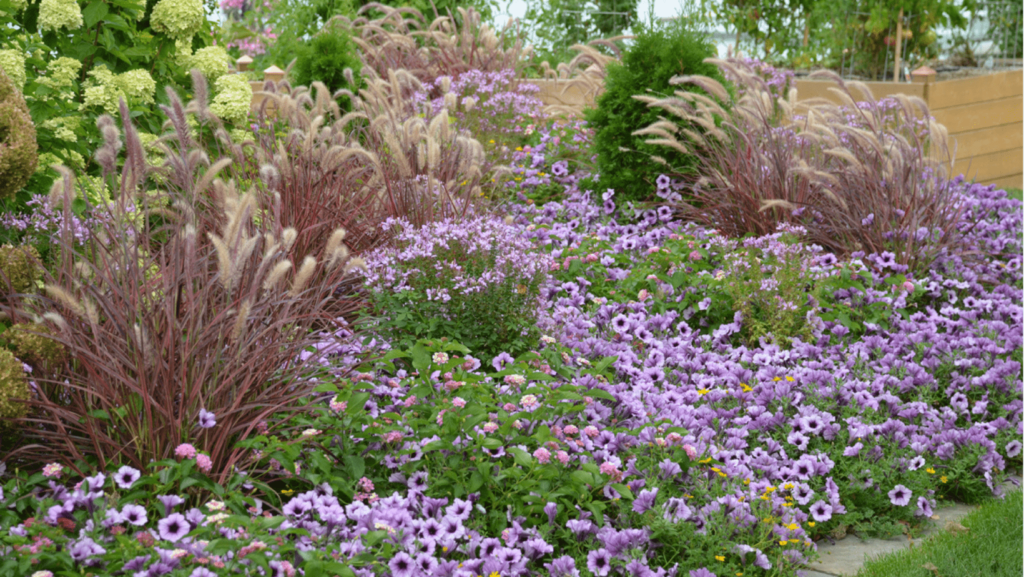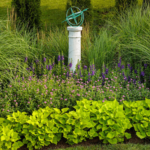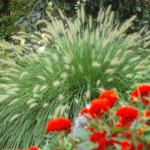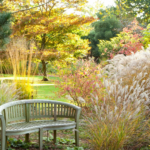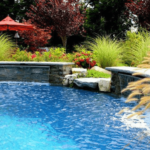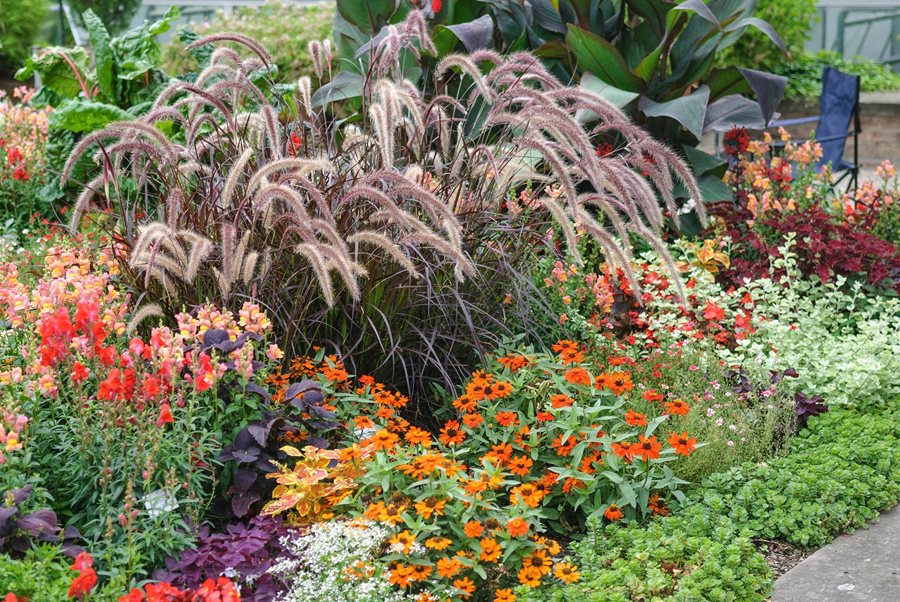
Maiden grass (Miscanthus sinensis) is a stunning ornamental grass known for its graceful appearance and versatility in landscaping. This tall, clump-forming perennial grass features:
- Slender, arching leaves that can reach 4-6 feet in height
- Feathery plumes that emerge in late summer or early fall
- A variety of cultivars with different leaf colors and sizes
Maiden grass adds texture, movement, and visual interest to gardens throughout the year. Its adaptability to various soil types and low maintenance requirements make it a popular choice among gardeners.
| Feature | Description |
|---|---|
| Height | 4-6 feet (up to 8 feet with plumes) |
| Spread | 3-5 feet |
| Foliage | Green, variegated, or striped |
| Plumes | Silver, pink, or copper |
| USDA Hardiness Zones | 5-9 |
RELATED BLOG
7-Impatiens Indoor Growing Mistakes To Avoid This Season
What to Plant with Maiden Grass-Top 13 Companions of Maiden Grass

Does Maiden Grass come back every year?
Yes, maiden grass is a perennial plant that comes back year after year. It follows this seasonal pattern:
- Dies back in late fall or early winter
- Remains dormant during winter months
- Begins to regrow from the base in spring
- Reaches full height by mid-summer
- Produces plumes in late summer or early fall
To maintain its health and appearance, cut back the dead foliage to about 6 inches above ground level in late winter or early spring before new growth emerges.
Where is the best place to plant maiden grass?
The ideal location for planting maiden grass includes:
- Full sun exposure (at least 6 hours of direct sunlight daily)
- Well-draining soil
- Adequate space for the plant to reach its full size
Maiden grass is versatile and can be used in various landscape settings:
- As a focal point in gardens or lawns
- In mass plantings for privacy screens or windbreaks
- Along borders or in mixed perennial beds
- Near water features for a natural, pond-side look
When choosing a location, consider the mature size of the plant and ensure it won’t overshadow smaller plants or obstruct views. With proper placement, maiden grass can become a stunning centerpiece in your landscape design.
What to plant with Maiden Grass
A. Ornamental grasses for texture variety

Pairing maiden grass with other ornamental grasses can create a visually striking display of diverse textures and forms. Consider these options:
- Blue Fescue (Festuca glauca)
- Purple Fountain Grass (Pennisetum setaceum ‘Rubrum’)
- Japanese Forest Grass (Hakonechloa macra)
| Grass Type | Height | Color | Texture |
|---|---|---|---|
| Blue Fescue | 6-12 inches | Blue-gray | Fine |
| Purple Fountain Grass | 3-5 feet | Purple-red | Feathery |
| Japanese Forest Grass | 12-18 inches | Green-gold | Cascading |
B. Ground covers plants with maiden grass
Low-growing plants can provide a beautiful contrast to the tall, upright form of maiden grass:
- Creeping Thyme (Thymus serpyllum)
- Sedum ‘Angelina’
- Mondo Grass (Ophiopogon japonicus)
C. Medium-height plants with maiden grass
To create depth and visual interest, incorporate medium-height plants around your maiden grass:
- Russian Sage (Perovskia atriplicifolia)
- Black-Eyed Susan (Rudbeckia fulgida)
- Coneflower (Echinacea purpurea)
D. Tall perennials plants with maiden grass
For a stunning backdrop to your maiden grass, consider these tall perennials:
- Joe Pye Weed (Eupatorium purpureum)
- Goldenrod (Solidago)
- New England Aster (Symphyotrichum novae-angliae)
By combining these complementary plants with maiden grass, you can create a dynamic and visually appealing garden landscape. The varying heights, textures, and colors will work together to showcase the beauty of maiden grass while adding depth and interest to your garden design.
Color Combinations with Maiden Grass
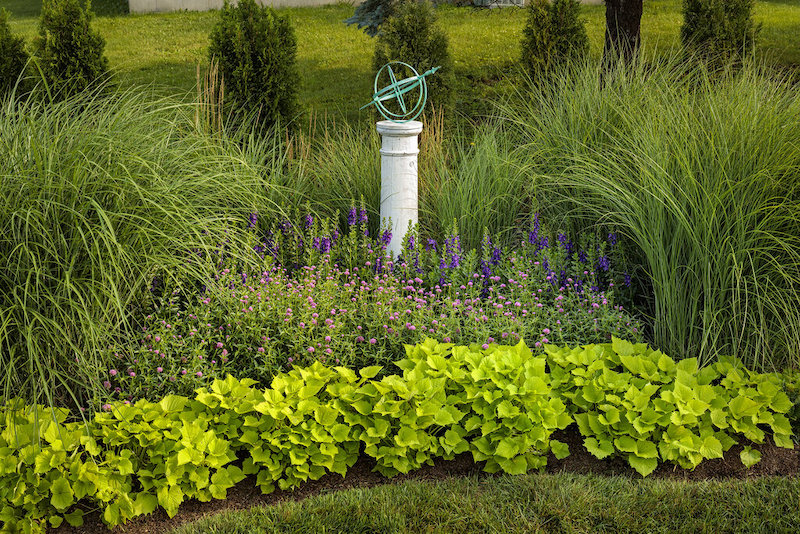
Now that we’ve explored complementary plants for maiden grass, let’s dive into exciting color combinations that can elevate your garden design. Maiden grass, with its silvery-green foliage and feathery plumes, provides an excellent backdrop for various colorful companions.
Red accents for bold contrast
Red flowering plants create a striking contrast against the silvery-green of maiden grass. Consider these options:
- Red Cardinal Flower (Lobelia cardinalis)
- Red Hot Poker (Kniphofia)
- Red Bee Balm (Monarda didyma)
| Plant | Bloom Time | Height | Sun Requirement |
|---|---|---|---|
| Red Cardinal Flower | July-September | 2-4 ft | Full sun to part shade |
| Red Hot Poker | Summer-Fall | 2-4 ft | Full sun |
| Red Bee Balm | July-September | 2-4 ft | Full sun to part shade |
Blue and white flowers for a cool palette
Blue and white flowers create a serene, cool atmosphere when paired with maiden grass:
- Russian Sage (Perovskia atriplicifolia)
- White Coneflower (Echinacea purpurea ‘White Swan’)
- Blue Salvia (Salvia farinacea)
Yellow and orange blooms for warmth
Warm yellows and oranges complement the cool tones of maiden grass beautifully:
- Black-Eyed Susan (Rudbeckia hirta)
- Coreopsis (Coreopsis grandiflora)
- Daylilies (Hemerocallis)
Purple and pink flowering plants
For a softer, romantic look, pair maiden grass with purple and pink blooms:
- Purple Coneflower (Echinacea purpurea)
- Pink Muhly Grass (Muhlenbergia capillaris)
- Lavender (Lavandula angustifolia)
By carefully selecting these color combinations, you can create a visually stunning garden that highlights the beauty of maiden grass throughout the seasons.
Seasonal Companions with maiden grass
Now that we’ve explored color combinations with maiden grass, let’s discover how to create a garden that shines in every season by pairing it with carefully chosen companions.
Winter-interest plants
Maiden grass provides striking winter interest with its tall, feathery plumes, but you can enhance the cold-season appeal by adding these companions:
- Red-twig dogwood (Cornus sericea)
- Winterberry holly (Ilex verticillata)
- Ornamental kale (Brassica oleracea)
Fall-color shrubs and trees
As maiden grass takes on golden hues in autumn, these plants offer complementary fall colors:
- Burning bush (Euonymus alatus)
- Japanese maple (Acer palmatum)
- Oakleaf hydrangea (Hydrangea quercifolia)
Summer-flowering perennials
While maiden grass reaches its peak in late summer, these perennials provide vibrant blooms throughout the season:
| Plant Name | Flower Color | Bloom Time |
|---|---|---|
| Coneflower (Echinacea) | Purple, pink, white | June-August |
| Black-eyed Susan (Rudbeckia) | Yellow | July-September |
| Russian sage (Perovskia atriplicifolia) | Lavender | July-October |
Spring-blooming bulbs
To kickstart your garden’s yearly cycle, plant these spring-flowering bulbs near maiden grass:
- Daffodils (Narcissus)
- Tulips (Tulipa)
- Alliums
By incorporating these seasonal companions, you’ll create a dynamic landscape that showcases the beauty of maiden grass while offering year-round visual interest.
Design Ideas for Maiden Grass Plantings
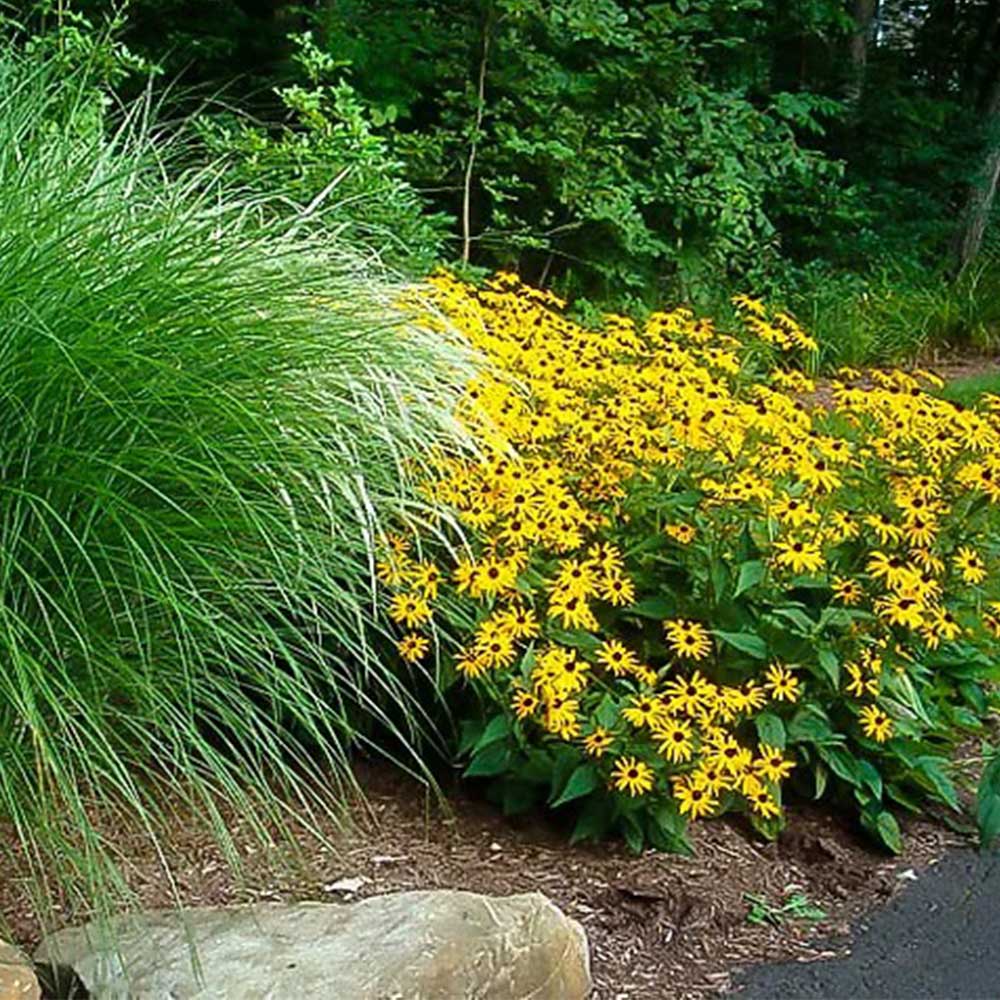
Now that we’ve explored various companions for maiden grass, let’s delve into creative design ideas that showcase this versatile ornamental grass.
A. Container gardening combinations
Maiden grass can be a stunning focal point in container gardens. Here are some ideas:
- Pair with trailing plants like sweet potato vine or creeping Jenny for a cascading effect
- Combine with colorful annuals like petunias or marigolds for contrast
- Use as a centerpiece surrounded by low-growing succulents
B. Water-wise landscaping with maiden grass
Maiden grass is drought-tolerant, making it perfect for water-wise gardens:
- Create a xeriscape design with other drought-resistant plants
- Use as a backdrop for a rock garden with sedums and cacti
- Incorporate into a gravel garden for a low-maintenance landscape
C. Asian-inspired garden designs
The graceful arching form of maiden grass lends itself well to Asian-inspired gardens:
- Plant alongside Japanese maples and bamboo for an authentic look
- Incorporate into a Zen garden with carefully placed rocks and gravel
- Use as a soft screen around a meditation area or tea house
D. Formal garden arrangements
Despite its naturalistic appearance, maiden grass can be used in formal gardens:
- Plant in symmetrical patterns along walkways or driveways
- Use as a living hedge or screen in structured garden rooms
- Combine with clipped boxwood or yew for a blend of formal and informal elements
E. Creating a naturalistic meadow look
Maiden grass shines in naturalistic plantings:
| Plant Combination | Effect |
|---|---|
| Maiden grass + Coneflowers + Black-eyed Susans | Wildflower meadow |
| Maiden grass + Ornamental grasses (e.g., Feather Reed Grass) | Prairie-style planting |
| Maiden grass + Native perennials | Biodiversity-friendly landscape |
By incorporating these design ideas, you can create stunning landscapes that showcase the beauty and versatility of maiden grass. Whether you prefer a formal, Asian-inspired, or naturalistic look, this ornamental grass can adapt to various garden styles and complement a wide range of plants.
Toxicity with Pets

When considering adding maiden grass to your landscape, it’s essential to understand its potential impact on wildlife and pets.
Is Maiden Grass Deer Resistant?
Maiden grass is generally considered deer-resistant. Its tough, fibrous texture and sharp leaf edges make it less appealing to deer. However, it’s important to note that no plant is entirely deer-proof, especially during times of food scarcity.
Do Deer Like Maiden Grass?
While deer may occasionally nibble on maiden grass, especially young shoots, it’s not a preferred food source. Deer typically avoid mature maiden grass due to its coarse texture and lack of nutritional value.
Is Maiden Grass Toxic to Cats and Dogs?
Good news for pet owners: maiden grass is not toxic to cats or dogs. However, ingestion of large amounts may cause mild gastrointestinal upset. It’s always best to monitor your pets and discourage them from eating ornamental grasses.
| Animal | Toxicity Level |
|---|---|
| Cats | Non-toxic |
| Dogs | Non-toxic |
Is Maiden Grass Evergreen?
Maiden grass is not evergreen. It’s a deciduous ornamental grass that goes dormant in winter. The foliage turns golden-brown in fall and can provide winter interest if left standing.
Does Maiden Grass Come Back Every Year?
Yes, maiden grass is a perennial that comes back every year in suitable growing conditions. It’s known for its reliability and longevity in the landscape. Here’s what you can expect throughout the year:
- Spring: New growth emerges
- Summer: Reaches full height and produces plumes
- Fall: Foliage changes color
- Winter: Goes dormant but can be left standing for visual interest
With its low toxicity and deer-resistant properties, maiden grass is an excellent choice for pet-friendly and wildlife-conscious gardens. Its annual cycle of growth and dormancy adds dynamic interest to your landscape throughout the seasons.
Selecting the right companions for maiden grass can transform your garden into a stunning, dynamic landscape. From contrasting textures to harmonious color schemes, the possibilities are endless. Remember to consider seasonal interest, design principles, and the overall aesthetic you wish to achieve. By pairing maiden grass with complementary plants, you can create a visually appealing and low-maintenance garden that thrives throughout the year.

